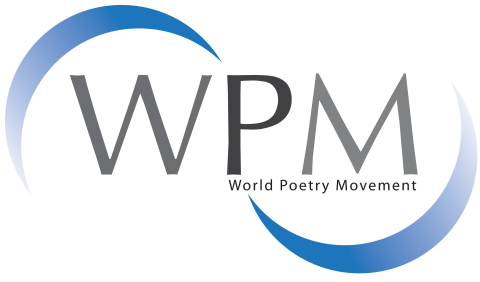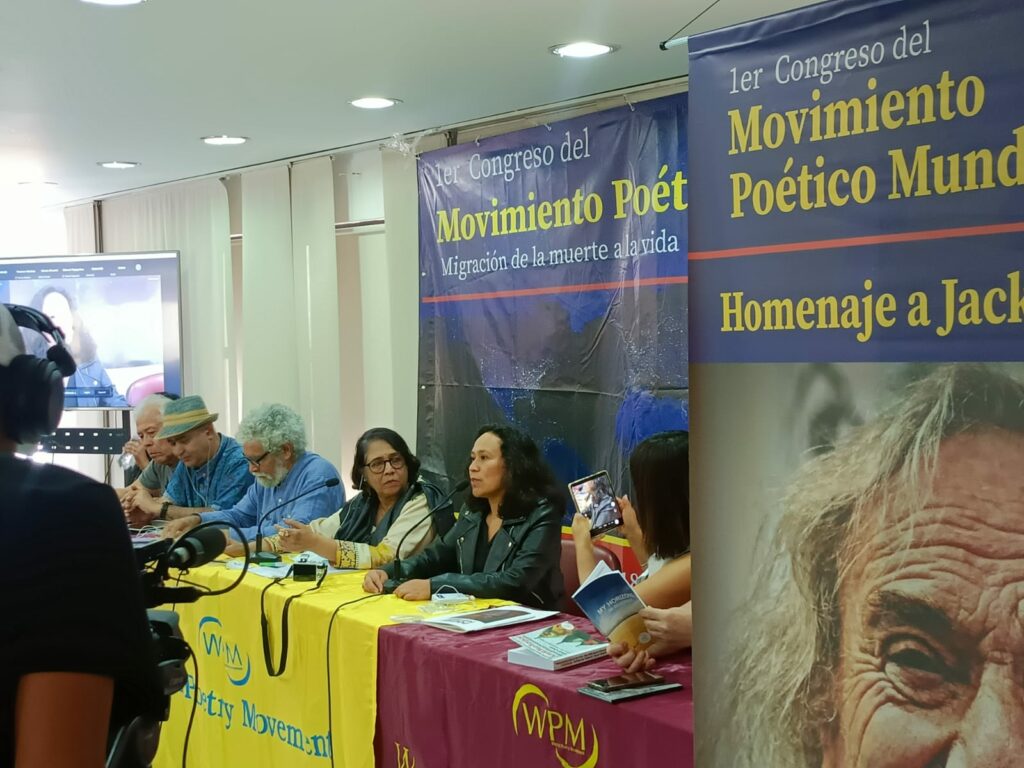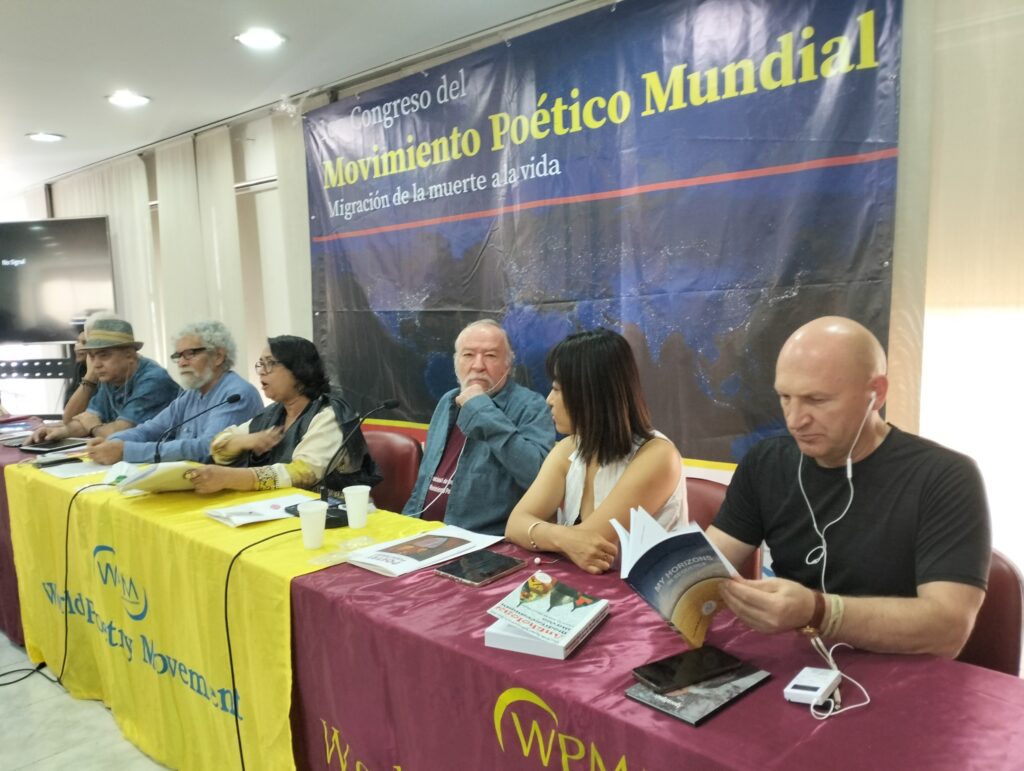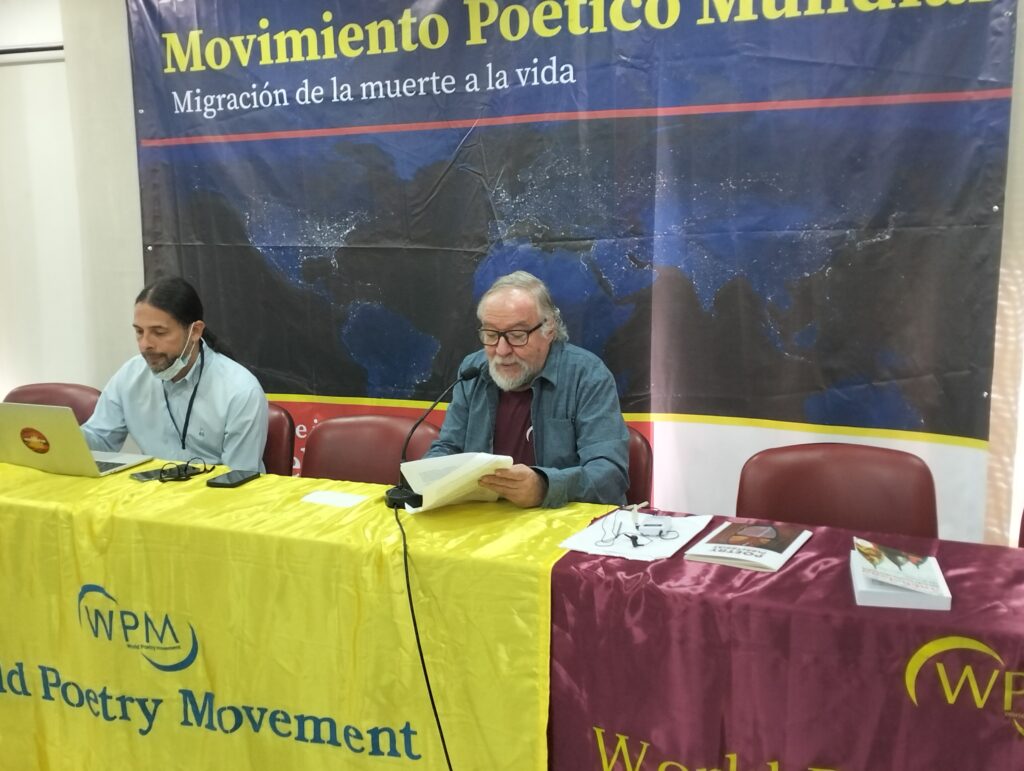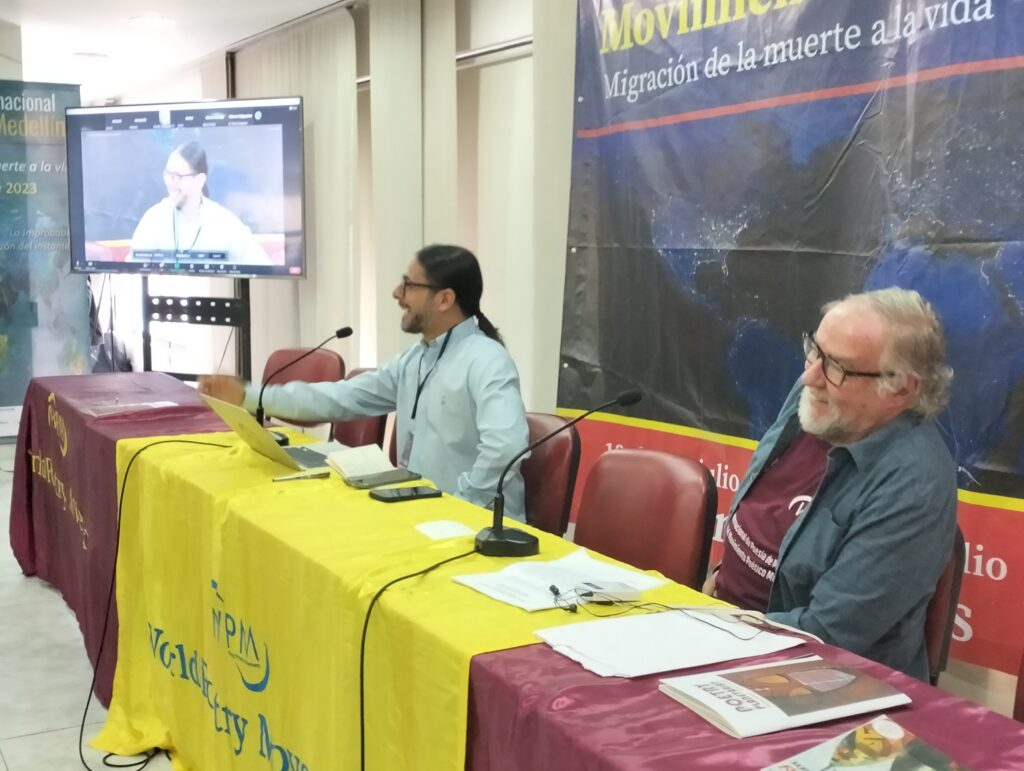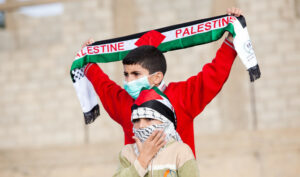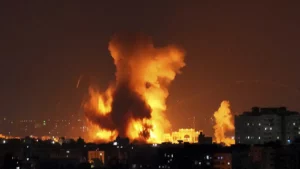Carried out by: Mónica Lucía Suárez (WPM Colombia) and Melissa Merlo (WPM Honduras).
Venue: Medellín, Colombia.
Time: 10:00 a.m. to 12:00 noon.
Fernando Rendón (Colombia)
He opens by welcoming the second session of the WPM Congress. He gives the floor to the Cuban poet Alex Pausides. He announces that this panel will be about the processes of organization and management of the WPM. With two conferences, arriving at 11:00 a.m., since Freddy Ñáñez must travel to Venezuela. He gives way to the presentations.
Alex Pausides (Cuba)
Expresses her joy at being reunited with friends. Thanks on behalf of the Cuban poet Nancy Morejón to Fernando and Francis for supporting her in Paris. Special greetings to the poet from Palestine.
Topic: Transit through the homeland of poetry. On WPM organization and management processes.
Key point: Participation of the poets of the world, integrating languages and geography in order to put poetry for the welfare of the world.
It raises how hegemonic forces turn cultural work into merchandise and not in the value of its creative process. WPM becomes a singular force, with scopes, goals and contributes to the creation of beauty for human betterment, spice and life on earth. It is necessary to articulate poetic actions to safeguard the world. It is also necessary to encourage literary creation, reading, pedagogical projects, the search for material sustainability of the projects. To exalt the native peoples. To care for the heritage of popular culture. To appreciate particular cosmogonies. Everything brings to the MPM a singular look and an autonomous positioning. Diversity makes us a single articulation. Each region developing its own actions, as a singular mosaic. Presence of a national and regional agenda, to invite countries that can be incorporated. To seduce the academy to favor a material support to the exchange.
To integrate schools at all levels in order to enrich the life of the human being and to assume culture as the basis of life, as well as the integration of the other arts. Public personalities, patrons, philanthropists, will be welcome in order to attract support for our projects and exchanges. Establishment of clubs of friends of WPM is crucial to promote our actions. Permanent linkage between nations and continents to bring purposes and actions closer together. Maintain a common language in a world without borders.
Rati Saxena (India)
She thanks all those who support this Congress. She thanks Alex Pausides for his speech.
She says we should expand the national chapters to invite more poets. Connect with small countries and attract them. Give importance to languages, so as not to lose them, since each language has its own poetry and we cannot allow them to be lost. To carry out national activities, not only international, according to the needs of our own nations, making known the particular poetry of each country. Invite the younger generations that stand out and that can also dedicate themselves to poetry, not only thinking that they must generate money. We must protect them from our neighborhoods to the whole country, to grow in more intelligent aspects not only for the economic. Raise funds to support the work teams, from different areas, raising money from different strategies. To increase communication, not only Facebook, to carry out more effective communication actions, that go beyond presenting photographs. Try to print more and more books, working for society, we are not an elite class, we must work for the people. Working for peace against war. To have our own satellite network site, for better communication and united web pages, with translations incorporated. Try to have more poetry festivals.
Taking care of the rivers and the land, also taking care of the insects, the environment. Transgender poetry, they are different poets without status, it is important to give them a voice.
Fernando Rendón
Presents Ángela Beltrán, representative of the Ministry of Culture of Colombia.
Ángela Beltrán (Colombia)
The Colombian government is seeking a profound reconstruction for the establishment of peace. She is grateful to be present and to have listened to the poetry, awakening in her the sensitivity towards poetry, which should be for everyone. In a country where violence is present from different positions and senses, poetry is a tool that allows us to connect from the sensitive. For the government it is wonderful to accompany this event and give support, which, although limited, is a commitment to poetry, convinced of strengthening the relationship between the arts and the school, which improves access to creative processes. We are beginning to talk about poetry schools in Colombia, forming a national system of artistic and cultural training, with key strategic axes, fundamental in the construction of peace. Accompanying social changes through culture. We bet on a culture of peace, with deep transformations, giving an agenda to anti-racism, so that a poetics and a comprehensive culture can grow. To build spaces for reflection where we work together, so that the arts contribute to the formation of sensitive human beings. The decision to protect our planet and life in all its forms.
Rosa Chávez (Maya Nation, Guatemala) moderates the first part of the dialogue
Claus Ankersen (Denmark)
Enrich the world of poetry, giving capacity and building knowledge in community brotherhood. Beyond enjoying poetry, we must give importance to getting to know each other and creating stronger ties and collaborations. I propose practical ways like a poetry cruise, with publishers, translators, poets, building poetry in community, moving around the world, embracing our capacities. Let poetry move.
Siphiwe Nzima (Lesotho)
To combine artistic forms in a single platform, to feel the impact on the public, without leaving sectors out, allowing to express from education, from the promotion of art. We must speak and act. Reach action and inclusive interaction. Strengthen the ties of all African countries. By uniting our dialogues, we will be more united. Promote dialogues with our governments and accompany in the initiatives that governments propose. All initiatives must include poetry, integrating excluded and vulnerable communities.
Boubé Saley (Níger)
The awareness of the people and the need for peace that we have in our countries. Poetry is part of life, we must have more manifestations of poetry. The poet is recognized, from different languages. We collect oral texts and interpret them as poems that accompany the history of the human being. Poetry written in more known languages has more followers, we must integrate our poetry also at this level. Orienting young people is also crucial, it is a reality in our country. We are organized, we give workshops, trying to reach all regions of Niger. We are trying to make poetry known in all countries. We are planning a festival so that poetry has a lot of richness and variety. We have the means and the possibility to organize activities and other poets to come and see us and participate.
Alexis Bernaut (France)
He agrees on the importance of increasing relations between us. From France, the institutions that direct poetry have a somewhat bourgeois vision of what poetry should be. We from WPM, we do things differently, we distribute poetry on posters, for the people, in a city where 35 languages are spoken, we experiment to publish poems to show the diversity of languages. We must fight fascism in the hearts of young people. We must strengthen our contacts made at this congress to continue our projects globally.
Ismael Diadie (Mali)
From his training as a historian, he mentions the different isms that were anchored in the world such as fascism, and poets emerged to counteract this. As poets we are facing again a similar stage, we must sow again the seed of the spirit of freedom for human existence. I ask the Medellin organization to introduce the Arabic language to the translations. One of the great languages of the universal tradition. The empire of written poetry, totalitarian, when it comes to organizing festivals. The poetry of oral tradition is a minority, we are authentic peoples, non-European peoples, we are peoples, with our own language and our own literature. Take into account the poets of orality. Let us not be accomplices of the colonial discourse, let us not repeat the colonial discourse. The work of WPM is to create a world poetic movement, where we cannot impose the totalitarianism of writing and reduce the oralities, the largest population that produces poetry, produces it from orality.
Ali Al Almeri (Jordan-Palestine)
It is very important to be all here connected, especially after the pandemic and what happened in the world, with a lot of sadness and tragedies. Arabic poetry is in the genes of our nation, the nation of poetry. Arabic language is more than 150 million in the world, that means Arabic language and Arabic words are part of the world. We need more connections for example with Jordan, and more activities with the new generations, with children and youth, and associations in all parts of the world, even from remote and marginalized areas. To bring out of the shadows those regions that have been made invisible. Over time we talk about many decisions, mainly from politicians, but they do not respond to the needs of the people, for example, from the UN. We must do something for Palestine, since 75 years ago this historical war must end. There are other cases in the world and we need to talk about them. In WPM we should do a lot of joint activities. Just like UNESCO makes brotherhoods between cities. We need to be able to make connections to do magic with sculptors and musicians, that poetry connects with the other arts as a brotherhood.
Ashraf Aboul-Yazid (Egypt)
He proposes to start the mornings with a line translated from another language and publish it on the networks, to make it known to the world. Mainly to motivate the publishing industry. His job is also to save nature, so we can publish to digital and less to traditional.
Ayo Ayoola-Amale (Ghana)
There is an unfavorable pattern for our continent, we want the WPM to recognize that we must have a record to move forward. If we want to move forward we must be recognized. All relationships must arise from trust, but we need a writing that says we must act to be recognized and respected. We need a sustainable movement, as WPM is the best and the biggest, but we must formalize in our country. The organizers must support us in this, give us a written order to legalize us in our countries, to be taken seriously. We want poetry to matter at WPM in Ghana. Reach out to teachers and students, to transform attitudes towards poetry.
Keshab Sigdel (Nepal)
There is a lot of confusion about WPM as to whether it is social political or poetry advocacy. It proposes a common cry, WPM should articulate the fundamentals of poetry as an art form, but also for social causes. It is important to show us how to facilitate the creative process and make it known. Poetry is a tool to intervene in political territory, we have obligations to the people and our people who have been evacuated and exiled, it is important to integrate aesthetics and how we use them for social purposes.
Fernando Rendón (Colombia)
He clarifies that the WPM has never been taken lightly, that the fact that this Congress is active and is the basis of a more powerful stage of the movement. It is also the fruit of the Medellin Poetry Festival, of 1800 poets, 187 countries, for more than three decades. Not individuals, but collectives. There cannot be a single member of the coordinating committee who does not have a job. With Monica Lucia, in Colombia, 40 joint poetic actions were deployed, as well as Cuba, India, Venezuela. Tasks resulting from an agreement.
WPM Strategic Plan
Fernando Rendón presents the Plan, which contains a WPM mission: it involves promoting poetry and dialogue between cultures, fostering creativity and disseminating it, working in collaboration with social institutions, communities and peoples. Men, women and children participating in workshops, poetry readings. The whole world as WPM. Accompanying human beings.
Values: freedom of expression, cultural diversity, world peace, creative dialogue, defense of nature, sustainability and social commitment, democracy, plurality, diversity of expressions, fight against fascism, inclusion, cultural and linguistic diversity and gender. A coordinating committee will be formed: 21 people (five from each continent) and an operational committee.
Freddy Ñáñez (Bolivarian Republic of Venezuela)
Evolution of this Congress, number of ideas that contribute to the contents of WPM that point towards action. There is a real possibility of articulation and work. From art we offer a plus, a contribution to humanity. Writing poetry we fulfill our role, the common factor is the inequality of opportunities and the lack of equity in basic conditions. A generalized social problem. Poetry is the lighthouse and the light, poetry schools can be the spaces of liaison with governments and states, crisis of values, ethics and civilization, which does not see the ecological, cultural and educational impact. Poetry itself is the place where opposites are moderated. The poem as a tool in a classroom has a pedagogical dimension. Understanding that what is offered is true. Effective application of what can be contributed in the educational field.
Indicators, results and costs should be kept. As a whole, it is possible to offer a cohesive project that offers these approaches that have been foreseen in the Strategic Plan.
The document contains the ideas, definitions and planning:
– Articulation of poetic actions to measure impact and present indicators. Based on quantitatively measurable actions from a higher qualitative action such as poetry. Capacity for concreteness. Capacity for local dialogue with its global potential. Real, serious organization with one or two unified projects. Measuring tools.
– Pedagogical project as a great project that has greater possibilities of being strong politics, World School of Poetry. On-line virtual connection. It has the possibility of giving work to 60 paid national poets. Inserted in the formal school. Systematization.
– Publishing project to circulate books. It is complex because a WPM publishing model must be sought. Digital publishing as an alternative, translations. There is a powerful school of born translators in WPM. Inclusive, incorporate writers into WPM.
– Communications for cohesion and unity of WPM, must be effective, beyond chat or online connection, spaces to make WPM visible, IP channel, communicators. Online workshops, tutorials.
– Defense of mother earth, human rights from poetry. Diversity, leaving western visions and making the struggle for human rights a truth. There is no humanity without nature. There are visions about nature and we can write about it. To preserve our autonomy as WPM but contributing to society.
